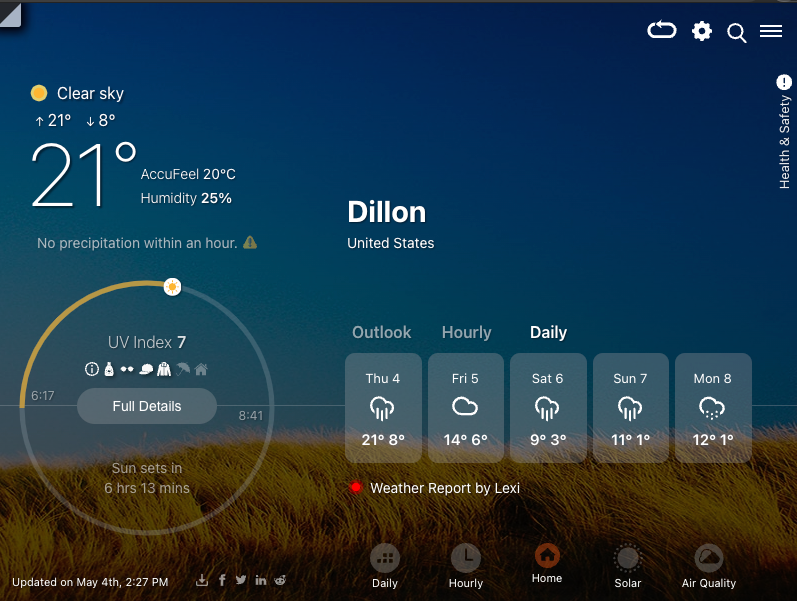4 min read . February 16, 2023
AI in Weather Forecasting is revolutionizing predictions with precise and reliable results. Using machine learning algorithms, data analytics, and pattern recognition, AI analyzes vast amounts of real-time weather data for more accurate forecasts. It also aids in severe weather prediction and climate modeling, improving preparedness and mitigation. Expect improved preparedness and mitigation of weather-related events with AI-powered weather forecasting.
AI-powered algorithms can analyze vast amounts of data from various sources. These sources include satellite images, ground-based sensors, and historical records, at an unprecedented speed. This enables meteorologists to identify patterns that were previously undetectable by human eyes or traditional computer models. Moreover, AI can learn from its mistakes and improve its predictions over time through machine learning techniques.
How Machine Learning Improves Forecasts
Machine learning is a subset of AI that allows computers to learn from data without being explicitly programmed. In the context of weather forecasting, machine learning algorithms can be trained on historical data sets. These sets contain information about past weather events and their atmospheric conditions. By analyzing this data, these algorithms can identify patterns that are indicative of specific types of weather events.
Once trained on historical data sets, machine learning models can be applied to current atmospheric conditions. This helps generate forecasts for future events. These models continuously update themselves as new data becomes available so they become increasingly accurate over time.
One significant advantage of using machine learning in weather prediction is its ability to process large volumes of diverse data quickly. Traditional numerical models struggle with this due to their reliance on simplifying assumptions about atmospheric processes.
Real-Life Applications of AI in Weather Forecasting
The integration of AI into meteorology has already led to several real-life applications that are improving our ability to predict severe weather events:
1) IBM’s Deep Thunder project uses deep learning techniques combined with high-resolution simulations for hyperlocal short-term weather forecasts. This helps businesses and governments make better decisions about resource allocation during extreme weather events.
2) The National Oceanic and Atmospheric Administration (NOAA) is using AI to improve the accuracy of its hurricane forecasts by analyzing satellite images and identifying patterns that indicate the formation of tropical cyclones.
3) Researchers at the University of Oklahoma are developing machine learning algorithms to predict tornadoes more accurately. This gives people in affected areas more time to prepare for these destructive storms.
4) The AI-powered sensors by companies like Tomorrow.io and Understory Weather help mitigate risks. The real-time, hyperlocal weather data is useful for industries such as agriculture, transportation, and insurance.
Future Possibilities: Smarter Weather Insights
As AI continues to advance, we can expect even smarter weather insights that will help us better understand our planet’s complex climate system. For example:
1) Improved early warning systems: By combining AI with advanced sensor networks, we could develop more accurate early warning systems for severe weather events. These systems can potentially save lives and reduce property damage from hurricanes, floods, and wildfires.
2) Personalized forecasts: With the help of AI-powered apps on our smartphones or smart home devices, we may soon receive personalized weather forecasts tailored specifically to our needs – whether it’s planning a picnic or deciding when to water our plants.
3) Climate change modeling: As climate change continues to impact global weather patterns, AI in weather forecasting can play a crucial role in understanding these changes by analyzing vast amounts of data from various sources. This will enable scientists to create more accurate models predicting future climate scenarios. It will also inform policy decisions aimed at mitigating the effects of climate change.
In conclusion, artificial intelligence is revolutionizing how we predict the weather by making forecasts more precise and reliable than ever before. Through machine learning techniques that analyze vast amounts of data quickly and efficiently, meteorologists are gaining new insights. These insights were previously unattainable about Earth’s atmosphere. As AI continues to advance, we can expect even smarter weather insights. These will help us better understand our planet’s complex climate system and prepare for the challenges of a changing world.
Don’t miss out on the future of weather forecasting
Get UV Weather, the advanced AI-powered browser extension for real-time weather updates and forecasts. Featured by Google, it offers personalized predictions for your outdoor activities and plant care. Download now from the Chrome Web Store and revolutionize your weather experience!
The UV Weather extension offers easy access to comprehensive weather information, including temperature, wind, humidity, and precipitation for multiple locations. Users can seamlessly switch between cities and view data in their browser toolbar. Additionally, the extension includes a live radar map and weather alerts for added convenience.
A unique Pro feature of this Chrome extension is its engaging AI-powered news-style reports, which offer a fresh perspective on traditional weather reports. Whether you need to know tomorrow’s weather or plan further ahead, this extension has you covered.
Users can access detailed forecasts, including wind direction, speed, gusts, and hourly air quality predictions. Health enthusiasts will appreciate real-time Air Quality Index updates and pollutant concentration levels. For those concerned about safety during extreme weather, the UV Weather extension provides essential advice on weather-related health and safety precautions.

UV Weather powered by Chat GPT 4
With detailed forecasts that include minute-by-minute precipitation updates and a 30-day outlook, the UV Weather extension allows for better planning. It displays solar times, AccuFeel temperature, and general trends for a more comprehensive understanding of the weather. This reliable tool offers hyperlocal weather information worldwide, making it a popular and essential Chrome extension for users.

